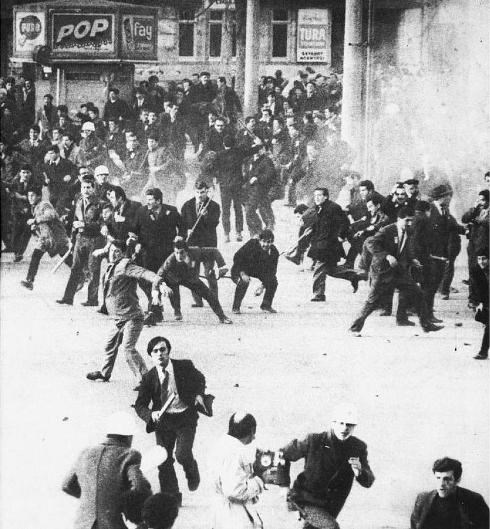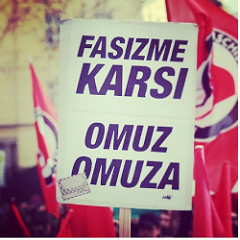by Duran Kalkan, Member of the Council of the KCK
Translated from the German version in Kurdistan Report
Undoubtedly, the success of a revolution depends on how strong its theory and practice is working in an regional, national and international frame. No revolution can be separated from the region and international struggles, and be successful on its own. This would be a very limited and nationalistic way of thinking. Of course, no revolutionary theory and practice can be developed without a regional and exclusively international approach. The danger of using these two mistakes – nationalism and dogmatic forms of internationslism – are exposed to all revolutionary movements based on national, class-based and gender-based contradictions. Especially in the national liberation movements the nationalist line was a determining factor, and many of them fell back into national narrow-mindedness. This general revolutionary directive is without doubt also valid for the revolution of Kurdistan and the development of the PKK.
In the struggle of the PKK – as a struggle for freedom and existence for a country and a society it was the right development of both, the national and the international aspects. The PKK has managed more than any other ideological-political currents in Kurdistan to successfully develop the national as well as the international aspects of the struggle and to understand Kurdistan as part of the global struggle for freedom. The creative analyzes of our Chairman Apo and his deep respect for every democratic attitude have played a decisive role in this development. We must emphasize the internationalist character of the PKK movement in order to understand its regional and international significance.
To analyse this, we have to understand the special circumstances in Kurdistan, therefore two points are necessary to understand: The first basis is the conditions from which the PKK has emerged. The peculiarities of the mid-1970s are well-known. In this phase, socialist and national-liberation movements are the most powerful. They affect humanity all over the world. But Kurdistan is one of the last countries reached by the socialist ideology and the national liberation struggle. Maybe even the last. This is not surprising. The system of destruction and the hundred-year-long regime of genocide imposed on Kurdistan, are unprecedented worldwide. We are talking about a political-military phase in which an identity is forbidden, isolated from the world, its connection to all global developments separated and destroyed by genocide.

While the people all over the world where taking up the ideas of socialism and national liberation movements and developing on this basis Kurdistan remains a long way out of this development. The second specific condition of the creation of the PKK is the fact that this isolation began to crumble in the early 1970s. There were many reasons for this. One of the fundamental is the new system of colonization, developed by the system of capitalist modernity with the US as a pioneer. The demand for global capital and the associated Turkish monopol-capital after the exploitation of the resources and wealth in Kurdistan played an important role. We must also recognize the increasing influence of revolutionary movements on Kurdistan that are developing all over the world in this time. Undoubtedly there were strong influences of the 1968 revolutionary movement of the youth and of the revolutionary youth resistance of Turkey in 1971. The victorious national revolutions of the socialist movements in Vietnam, Cuba and Africa also had an influence in the mid-1970s. (…)
According to this background, the organization and action line of the PKK has emerged. The reformist, bourgeois, and nationalist parts of the Kurdish society remained limited to groups or organizations consisting only on Kurdish people because they were based only on Kurdish nationalism. The PKK, on the other hand, had from the beginning on its base among Kurdish intellectual youths, but with great self-assurance welcomed Turkish and increasingly revolutionaries from all over the world.
The theoretical understanding, the ideological-political line and structure of the PKK were open to this. It was not based on a narrow Kurdish nationalism, but based on the national and social liberation of all the oppressed. As a result, all who wanted to fight for freedom of values and democracy could find space and opportunities for accession and struggle in the PKK. (…) In the phase of the founding of the ideological group and the development of the ideological-political line, Chairman Apo has fought together with the comrades Haki Karer and Kemal Pir. They created common revolutionary reflections and developed an ideological-political line that builded up a possibility for the freedom of Kurdistan. From the beginning on the group offered non-Kurdish revolutionaries the possibility to work in the structures.
The openness of the political line of the PKK led to the fact that as a movement it carried the revolutionary experiences of the peoples of the world to Kurdistan in the middle of the 1970s. The party considered the Vietnamese and the Cuban revolution, the revolutions in Africa, the October Revolution, and the 68s movement in Europe as her own background. She drew her lessons from her rich revolutionary experiences and tried to analyze Kurdistan and develop her theory and practice of freedom in Kurdistan. The PKK became a Kurdish arm of the global struggle. She took the international experience and carried it to the national level. This was the internationalism of the PKK at its founding time. Therefor the developments in Kurdistan are being pursued with great interest by the peoples and oppressed of the world.
The fight against the fascism of IS and AKP / MHP is followed by the youth, the women and all the oppressed around the world in solidarity. Just as the PKK initially drew its lessons from the revolutionary struggles of the peoples of the world at the time of its creation, so today the peoples, oppressed, women and youth all over the world are drawing their lessons from the revolutionary practice of the PKK. They regard their struggle as their own. In the 1970s, the PKK emerged as a movement that saw the struggles of all other peoples as their own. Thus, she has created fraternal and internationalist unity and solidarity. Therefor today all peoples and oppressed consider the experience of the PKK as their own practice and experience. They come to the PKK and fight with us. The revolution in Rojava best represents the internationalist character of the PKK.
 Two aspects make it an internationalist attraction. First, the resistance against IS fascism. (…) Secondly, the ideological-political line supported by the Rojava revolution and the new social structure that has been developed. We call it the structure of the democratic nation. Such a nation construction happens on the line of democratic confederalism and democratic autonomy. Chairman Apo said, “The democratic nation is the most effective way to socialism.” This is the result of finding a solution to the Kurdish question, one of the most difficult and complicated issue in the world. Chairman Apo proposed it as a solution model for the Kurdish question, but also made clear that it could be a solution model for all social problems. He has argued that this approach can resolve the issue of women’s freedom, all religious and national issues, and the development of democratic resistance against class-based oppression. This model is based on the free individual who takes his place within the democratic communities. The individual freedom is based on the democratic society, on the democratic communalism, realized in democratic communities together with the democratic commune. (…)
Two aspects make it an internationalist attraction. First, the resistance against IS fascism. (…) Secondly, the ideological-political line supported by the Rojava revolution and the new social structure that has been developed. We call it the structure of the democratic nation. Such a nation construction happens on the line of democratic confederalism and democratic autonomy. Chairman Apo said, “The democratic nation is the most effective way to socialism.” This is the result of finding a solution to the Kurdish question, one of the most difficult and complicated issue in the world. Chairman Apo proposed it as a solution model for the Kurdish question, but also made clear that it could be a solution model for all social problems. He has argued that this approach can resolve the issue of women’s freedom, all religious and national issues, and the development of democratic resistance against class-based oppression. This model is based on the free individual who takes his place within the democratic communities. The individual freedom is based on the democratic society, on the democratic communalism, realized in democratic communities together with the democratic commune. (…)
After the experiences of real socialism, the revolutionary activities in Rojava carry in themselves the capacity of a particularly important experience for the democratic socialist society. (…) That’s what makes it a global magnet. There is a great interest in getting to know and understanding the development in Rojava, to receive and pass on the lessons of this revolution. In this sense, both the resistance to IS fascism and the construction of a new society have the capacity to publicize and spread the freedom revolution in Kurdistan. This expresses its internationalist character.